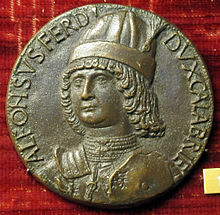Alfonso II of Naples
| Alfonso II | |
|---|---|

Medal of Alfonso as Duke of Calabria by Adriano Fiorentino, 1481
|
|
| King of Naples | |
| Reign | 25 January 1494 – 18 December 1495 |
| Predecessor | Ferdinand I |
| Successor | Ferdinand II |
| Born | 4 November 1448 Naples |
| Died | 18 December 1495 (aged 47) Messina |
| Burial | Messina Cathedral |
| Spouse | Ippolita Maria Sforza |
| Issue |
Ferdinand II, King of Naples Isabella, Duchess of Milan Sancha of Aragon Alfonso |
| House | House of Trastámara |
| Father | Ferdinand I of Naples |
| Mother | Isabella of Clermont |
| Religion | Roman Catholicism |
Alfonso II (4 November 1448 – 18 December 1495), also called Alfonso of Aragon, was King of Naples from 25 January 1494 to 22 February 1495 with the title King of Naples and Jerusalem. As Duke of Calabria he was a patron of Renaissance poets and builders during his tenure as the heir to the throne of Naples.
Born at Naples, Alfonso was the eldest child of Ferdinand I of Naples by his first wife, Isabella of Clermont. She was the daughter of Tristan, Count of Copertino and Caterina Del Balzo Orsini. Alfonso was the cousin of Ferdinand II of Aragon, king of Aragon and the first (co-)ruler of a unified Spain. His teacher was the humanist Giovanni Pontano, whose De splendore describes the proper virtues and manner of life becoming to a prince.
When his mother Isabella of Clermont died (1465), he succeeded to her feudal claims, which included the Brienne claim to the Kingdom of Jerusalem.
In 1463, when Alfonso was fifteen, his great-uncle Giovanni Antonio del Balzo Orsini, Prince of Taranto, died, and he obtained some lands from the inheritance. Alfonso had shown himself a skilled and determined soldier, helping his father in the suppression of the Conjure of the Barons (1485) and in the defence of the Kingdom's territory against the Papal claims.
As a condottiero, he fought in the most important wars of the age, such the war following the Pazzi Conspiracy (1478–1480) and the War of Ferrara (1482–1484).
...
Wikipedia
